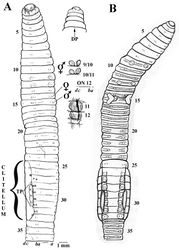Eisenia nordenskioldi onon
| Notice: | This page is derived from the original publication listed below, whose author(s) should always be credited. Further contributors may edit and improve the content of this page and, consequently, need to be credited as well (see page history). Any assessment of factual correctness requires a careful review of the original article as well as of subsequent contributions.
If you are uncertain whether your planned contribution is correct or not, we suggest that you use the associated discussion page instead of editing the page directly. This page should be cited as follows (rationale):
Citation formats to copy and paste
BibTeX: @article{Blakemore2013ZooKeys285, RIS/ Endnote: TY - JOUR Wikipedia/ Citizendium: <ref name="Blakemore2013ZooKeys285">{{Citation See also the citation download page at the journal. |
Ordo: Oligochaeta
Familia: Lumbricidae
Genus: Eisenia
Name
Eisenia nordenskioldi Blakemore, 2013 ssp. n. – Wikispecies link – Pensoft Profile
Material examined
Holotype (H) NIBR IV0000261277 (mature, dissected, providing DNA sample - wo65) plus six sub-adults provisionally listed as paratypes (IV000061278) and a ‘tail’, all poorly-preserved in same batch from “2012-7-20 Dadal”. Unidentifiable were ca. 20 specimens (IV0000261279) some having clitella ca. 24-33 and TP ca. 28-30, also poorly-preserved from crowding in a single tube, labelled “2012-7-21 Dadal”. All specimens collected by NIBR’s Mr T.-S. Park.
Etymology
Nominative noun in apposition after sample region where Dadal and the upper Onon River are supposed birthplace and likely final resting place of Temüjin (otherwise known as Genghis Khan).
Description
Body medium sized, H 100 mm. Segments 170. Reddish pink anterior-dorsum to segment 15 otherwise unpigmented. Epilobous. Pale laterally around cd in 8-11 and slightly tumid ab on 11-12 and possibly somewhat on clitellum. First dorsal pore 4/5. Spermathecal pores in 9/10/11 mid-dorsally. Female and male pores slight, lateral of b setae on 14 and 15, respectively. Nephridia sporadically visible lateral of b lines near intersegments (at least on clitellum) otherwise near d lines? Clitellum, pale from 24 dorsally or laterally 25-33, i.e., 24,25-33 . TP longitudinally lenticular lateral of b 28-31. External features rather unclear due to poor preservation.
Internally similar to nominal subspecies. Seminal vesicles in 9-12. Testis iridescent, free in 10 & 11. Calciferous glands in 11 & 12, vascularized and extending slightly into adjacent segments. Nephridial bladders sausage-shaped. Gizzard 17-18 and thin inverted T-shaped typhlosole present. Soil with coarse organic debris in gut. No parasites were noted.
Remarks
The current taxon differs from previously described subspecies (Tab. 1 and Appendix 2) on its clitellum, TP and tumescences; moreover it appears fertile. Fresher and better preserved material should confirm this analysis. In the meantime, although physically closest to Eisenia nordenskioldi mongol, it is clearly separated objectively on mtDNA data (Appendix 1). This compares to its sibling species-complex: European Eisenia fetida (Savigny, 1826) vs. Eisenia andrei Bouché, 1972 that is claimed to differ molecularly on enzyme gel electrophoresis, e.g. by Jaenike (1982)[1] based on material from New York, but never yet on respective types of either taxon (see Appendix 1 and Discussion).
Taxon Treatment
- Blakemore, R; 2013: Earthworms newly from Mongolia (Oligochaeta, Lumbricidae, Eisenia ) ZooKeys, 285: 1-21. doi
Other References
- ↑ Jaenike J (1982) ‘Eisenia foetida’ is two biological species. Megadrilogica 4: 6-8.
Images
|
